- Home
- Fredric Brown
The Second Fredric Brown Megapack: 27 Classic Science Fiction Stories Page 10
The Second Fredric Brown Megapack: 27 Classic Science Fiction Stories Read online
Page 10
“Fan me with a blowtorch, Beautiful,” Bill said. “It’s the McCoy.” He went to the closet and grabbed a valise, hurried to a cabinet and began to stuff instruments and bottles into the valise. He was ready by the time there was a knock on the door.
He said, “Hold the fort, Beautiful. Got to see a man about a mouse.” He joined the policemen waiting outside his door and was escorted through the crowd and into the circle of the elect and into the tent.
There was a crowd around the spot where the cylinder lay. Bill peered over shoulders and saw that the cylinder was neatly split in half. The inside was hollow and padded with something that looked like fine leather, but softer. A man kneeling at one end of it was talking.
“—not a trace of any activating mechanism, any mechanism at all, in fact. Not a wire, not a grain or a drop of any fuel. Just a hollow cylinder, padded inside. Gentlemen, it couldn’t have traveled by its own power in any conceivable way. But it came here, and from outside. Gravesend says the material is definitely extraterrestrial. Gentlemen, I’m stumped.”
Another voice said, “I’ve an idea, Major.” It was the voice of the man over whose shoulder Bill Wheeler was leaning and Bill recognized the voice and the man with a start. It was the President of the United States. Bill quit leaning on him.
“I’m no scientist,” the President said. “And this is just a possibility. Remember the one blast, out of that single exhaust hole? That might have been the destruction, the dissipation of whatever the mechanism or the propellant was. Whoever, whatever, sent or guided this contraption might not have wanted us to find out what made it run. It was constructed, in that case, so that, upon landing, the mechanism destroyed itself utterly. Colonel Roberts, you examined that scorched area of ground. Anything that might bear out that theory?”
“Definitely, sir,” said another voice. “Traces of metal and silica and some carbon, as though it had been vaporized by terrific heat and then condensed and uniformly spread. You can’t find a chunk of it to pick up, but the instruments indicate it. Another thing—”
Bill was conscious of someone speaking to him. “You’re Bill Wheeler, aren’t you?”
Bill turned, “Professor Winslow!” he said. “I’ve seen your picture, sir, and I’ve read your papers in the Journal. I’m proud to meet you and to—”
“Cut the malarkey,” said Professor Winslow, “and take a gander at this.” He grabbed Bill Wheeler by the arm and led him to a table in one corner of the tent.
“Looks for all the world like a dead mouse,” he said, “but it isn’t. Not quite. I haven’t cut in yet; waited for you and Grimm. But I’ve taken temperature tests and had hairs under the mike and studied musculature. It’s—well, look for yourself.”
Bill Wheeler looked. It looked like a mouse all right, a very small mouse, until you looked closely. Then you saw little differences, if you were a biologist.
Grimm got there and—delicately, reverently—they cut in. The differences stopped being little ones and became big ones. The bones didn’t seem to be made of bone, for one thing, and they were bright yellow instead of white. The digestive system wasn’t too far off the beam, and there was a circulatory system and a white milky fluid in it, but there wasn’t any heart. There were, instead, nodes at regular intervals along the larger tubes.
“Way stations,” Grimm said. “No central pump. You might call it a lot of little hearts instead of one big one. Efficient, I’d say. Creature built like this couldn’t have heart trouble. Here, let me put some of that white fluid on a slide.”
Someone was leaning over Bill’s shoulder, putting uncomfortable weight on him. He turned his head to tell the man to get the hell away and saw it was the President of the United States. “Out of this world?” the President asked quietly.
“And how,” said Bill. A second later he added, “Sir,” and the President chuckled. He asked, “Would you say it’s been dead long or that it died about the time of arrival?”
Winslow answered that one. “It’s purely a guess, Mr. President, because we don’t know the chemical make-up of the thing, or what its normal temperature is. But a rectal thermometer reading twenty minutes ago, when I got here, was ninety-five three and one minute ago it was ninety point six. At that rate of heat loss, it couldn’t have been dead long.”
“Would you say it was an intelligent creature?”
“I wouldn’t say for sure, Sir. It’s too alien. But I’d guess—definitely no. No more so than its terrestrial counterpart, a mouse. Brain size and convolutions are quite similar.”
“You don’t think it could, conceivably, have designed that ship?”
“I’d bet a million to one against it, Sir.”
It had been mid-afternoon when the spaceship had landed; it was almost midnight when Bill Wheeler started home. Not from across the street, but from the lab at New York U., where the dissection and microscopic examinations had continued.
He walked home in a daze, but he remembered guiltily that the Siamese hadn’t been fed, and hurried as much as he could for the last block.
She looked at him reproachfully and said “Miaouw, miaouw, miaouw, miaouw—” so fast he couldn’t get a word in edgewise until she was eating some liver out of the icebox.
“Sorry, Beautiful,” he said then. “Sorry, too, I couldn’t bring you that mouse, but they wouldn’t have let me if I’d asked, and I didn’t ask because it would probably have given you indigestion.”
He was still so excited that he couldn’t sleep that night. When it got early enough he hurried out for the morning papers to see if there had been any new discoveries or developments.
There hadn’t been. There was less in the papers than he knew already. But it was a big story and the papers played it big.
He spent most of three days at the New York U. lab, helping with further tests and examinations until there just weren’t any new ones to try and darn little left to try them on. Then the government took over what was left and Bill Wheeler was on the outside again.
For three more days he stayed home, tuned in on all news reports on the radio and video and subscribed to every newspaper published in English in New York City. But the story gradually died down. Nothing further happened; no further discoveries were made and if any new ideas developed, they weren’t given out for public consumption.
It was on the sixth day that an even bigger story broke—the assassination of the President of the United States. People forgot the spaceship.
Two days later the prime minister of Great Britain was killed by a Spaniard and the day after that a minor employee of the Politburo in Moscow ran amuck and shot a very important official.
A lot of windows broke in New York City the next day when a goodly portion of a county in Pennsylvania went up fast and came down slowly. No one within several hundred miles needed to be told that there was—or had been—a dump of A-bombs there. It was in sparsely populated country and not many people were killed, only a few thousand.
That was the afternoon, too, that the president of the stock exchange cut his throat and the crash started. Nobody paid too much attention to the riot at Lake Success the next day because of the unidentified submarine fleet that suddenly sank practically all the shipping in New Orleans harbor.
It was the evening of that day that Bill Wheeler was pacing up and down the front room of his apartment. Occasionally he stopped at the window to pet the Siamese named Beautiful and to look out across Central Park, bright under lights and cordoned off by armed sentries, where they were pouring concrete for the anti-aircraft gun emplacements.
He looked haggard.
He said, “Beautiful, we saw the start of it, right from this window. Maybe I’m crazy, but I still think that spaceship started it. God knows how. Maybe I should have fed you that mouse. Things couldn’t have gone to pot, so suddenly without help from somebody or something.”
He shook his head slowly. “Let’s dope it out, Beautiful. Let’s say something came in on that ship besides a dead mouse.
What could it have been? What could it have done and be doing?”
“Let’s say that the mouse was a laboratory animal, a guinea pig. It was sent in the ship and it survived the journey but died when it got here. Why? I’ve got a screwy hunch, Beautiful.”
He sat down in a chair and leaned back, staring up at the ceiling. He said, “Suppose the superior intelligence—from Somewhere—that made that ship came in with it. Suppose it wasn’t the mouse—let’s call it a mouse. Then, since the mouse was the only physical thing in the spaceship, the being, the invader, wasn’t physical. It was an entity that could live apart from whatever body it had back where it came from. But let’s say it could live in any body and it left its own in a safe place back home and rode here in one that was expendable, that it could abandon on arrival. That would explain the mouse and the fact that it died at the time the ship landed.”
“Then the being, at that instant, just jumped into the body of someone here—probably one of the first people to run toward the ship when it landed. It’s living in somebody’s body—in a hotel on Broadway or a flophouse on the Bowery or anywhere—pretending to be a human being. That make sense, Beautiful?”
He got up and started to pace again.
“And having the ability to control other minds, it sets about to make the world—the Earth—safe for Martians or Venusians or whatever they are. It sees—after a few days of study—that the world is on the brink of destroying itself and needs only a push. So it could give that push.”
“It could get inside a nut and make him assassinate the President, and get caught at it. It could make a Russian shoot his Number 1. It could make a Spaniard shoot the prime minister of England. It could start a bloody riot in the U. N., and make an army man, there to guard it, explode an A-bomb dump. It could—hell, Beautiful, it could push this world into a final war within a week. It practically has done it.”
He walked over to the window and stroked the cat’s sleek fur while he frowned down at the gun emplacements going up under the bright floodlights.
And he’s done it and even if my guess is right I couldn’t stop him because I couldn’t find him. And nobody would believe me, now. He’ll make the world safe for Martians. When the war is over, a lot of little ships like that—or big ones—can land here and take over what’s left ten times as easy as they could.
He lighted a cigarette with hands that shook a little. He said, “The more I think of it, the more—”
He sat down in the chair again. He said, “Beautiful, I’ve got to try. Screwy as that idea is, I’ve got to give it to the authorities, whether they believe it or not. That Major I met was an intelligent guy. So is General Keely. I—”
He started to walk to the phone and then sat down again. “I’ll call both of them, but let’s work it out just a little finer first. See if I can make any intelligent suggestions how they could go about finding the—the being—”
He groaned. “Beautiful, it’s impossible. It wouldn’t even have to be a human being. It could be an animal, anything. It could be you. He’d probably take over whatever nearby type of mind was nearest his own. If he was remotely feline, you’d have been the nearest cat.”
He sat up and stared at her. He said, “I’m going crazy, Beautiful. I’m remembering how you jumped and twisted just after that spaceship blew up its mechanism and went inert. And, listen, Beautiful, you’ve been sleeping twice as much as usual lately. Has your mind been out—”
“Say, that would be why I couldn’t wake you up yesterday to feed you. Beautiful, cats always wake up easily. Cats do.”
Looking dazed, Bill Wheeler got up out of the chair. He said, “Cat, am I crazy, or—”
The Siamese cat looked at him languidly through sleepy eyes. Distinctly it said, “Forget it.”
And halfway between sitting and rising, Bill Wheeler looked even more dazed for a second. He shook his head as though to clear it.
He said, “What was I talking about, Beautiful? I’m getting punchy from not enough sleep.”
He walked over to the window and stared out, gloomily, rubbing the cat’s fur until it purred.
He said, “Hungry, Beautiful? Want some liver?”
The cat jumped down from the windowsill and rubbed itself against his leg affectionately.
It said, “Miaouw.”
THE DOME
Kyle Braden sat in his comfortable armchair and stared at the switch in the opposite wall, wondering for the millionth—or was it the billionth?—time whether he was ready to take the risk of pulling it. The millionth or the billionth time in—it would be thirty years today, this afternoon.
It meant probable death and in just what form he didn’t know. Not atomic death certainly—all the bombs would have been used up many many years ago. They’d have lasted long enough to destroy the fabric of civilization, yes. There were more than enough bombs for that. And his careful calculations, thirty years ago, had proven that it would be almost a century before man got really started on a new civilization—what was left of him.
But what went on now, out there, outside the domelike force field that still shielded him from horror? Men as beasts? Or had mankind gone down completely and left the field to the other and less vicious brutes? No, mankind would have survived somewhere; he’d make his way back eventually. And possibly the record of what he had done to himself would remain, at least as legend, to deter him from doing it a second time. Or would it deter him even if full records remained to him?
Thirty years, Braden thought. He sighed at the weary length of them. Yet he’d had and still had everything he really needed and lonesomeness is better than sudden death. Life alone is better than no life at all—with death in some horrible form.
So he had thought thirty years ago, when he had been thirty-seven years old. So he still thought now at sixty-seven. He didn’t regret what he had done, not at all. But he was tired. He wondered, for the millionth—or the billionth?—time whether he wasn’t ready to pull that lever.
Just maybe, out there, they’d have struggled back to some reasonable, if agrarian, form of living. And he could help them, could give them things and knowledge they’d need. He could savor, before he was really old, their gratitude and the good feeling of helping them.
Then too he didn’t want to die alone. He’d lived alone and it had been tolerable most of the time—but dying alone was something else. Somehow dying alone here would be worse than being killed by the neo-barbarians he expected to find out there. The agrarians were really too much to hope for after only thirty years.
And today would be a good day for it. Exactly thirty years, if his chronometers were still accurate, and they wouldn’t be far wrong even in that length of time. A few more hours to make it the same time of day, thirty years to the minute. Yes, irrevocable as it was, he’d do it then. Until now the irrevocability of pulling that switch had stopped him every time he’d considered it.
If only the dome of force could be turned off and then on again the decision would have been easy and he’d have tried it long ago. Perhaps after ten years or fifteen. But it took tremendous power to create the field if very little power to maintain it. There’d still been outside power available when he’d first flashed it on.
Of course the field itself had broken the connection—had broken all connection—once he’d flashed it into being, but the power sources within the building had been enough to supply his own needs and the negligible power required to maintain the field.
Yes, he decided suddenly and definitely, he’d pull that switch today as soon as the few hours were up that would make the time exactly thirty years. Thirty years was long enough to be alone.
He hadn’t wanted to be alone. If only Myra, his secretary, hadn’t walked out on him when… It was too late to think of that—but he thought of it as he had a billion times before. Why had she been so ridiculous about wanting to share the fate of the rest of humanity, to try to help those who were beyond help? And she’d loved him. Aside from that quixotic idea
she’d have married him. He’d been too abrupt in explaining the truth—he’d shocked her. But how wonderful it would have been had she stayed with him.
Partly the fault was that the news had come sooner than he’d anticipated. When he’d turned the radio off that morning he’d known there were only hours left. He’d pressed the button that summoned Myra and she’d come in, beautiful, cool, unruffled. You’d think she never listened to the newscasts or read the papers, that she didn’t know what was happening.
“Sit down, my dear,” he’d told her. Her eyes had widened a bit at the unexpected form of address but she’d gracefully seated herself in the chair in which she always sat to take dictation. She poised her pencil.
“No, Myra,” he said. “This is personal—very personal. I want to ask you to marry me.”
Her eyes really widened. “Dr. Braden, are you—joking?”
“No. Very definitely not. I know I’m a bit older than you but not too much so, I hope. I’m thirty-seven although I may seem a bit older right now as a result of the way I’ve been working. You’re—is it twenty-seven?”
“Twenty-eight last week. But I wasn’t thinking of age. It’s just—well. ‘This is so sudden,’ sounds like I’m joking, but it is. You’ve never even”—she grinned impishly—“you’ve never even made a pass at me. And you’re about the first man I’ve ever worked for who hasn’t.”
Braden smiled at her. “I’m sorry. I didn’t know it was expected. But, Myra, I am serious. Will you marry me?”
She looked at him thoughtfully. “I—don’t know. The strange thing is that—I guess I am in love with you a little. I don’t know why I should be. You’ve been so impersonal and businesslike, so tied up in your work. You’ve never even tried to kiss me, never even paid me a compliment.”
“But—well, I don’t like this sudden and—unsentimental—a proposal. Why not ask me again sometime soon. And in the meantime—well, you might even tell me that you love me. It might help.”

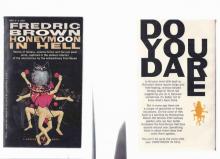 Hall of Mirrors
Hall of Mirrors Honeymoon in Hell
Honeymoon in Hell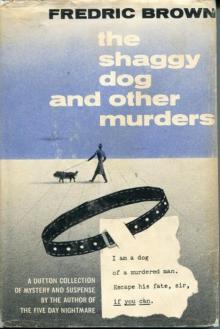 The Shaggy Dog and Other Murders
The Shaggy Dog and Other Murders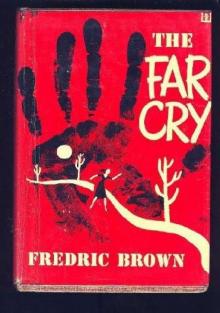 The Far Cry
The Far Cry Arena
Arena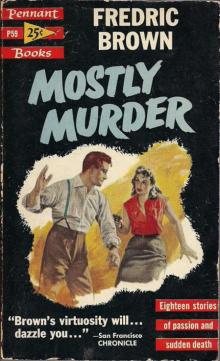 Mostly Murder
Mostly Murder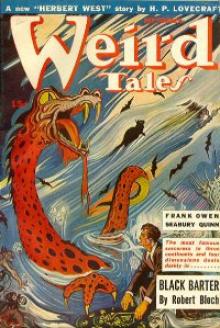 The Geezenstacks
The Geezenstacks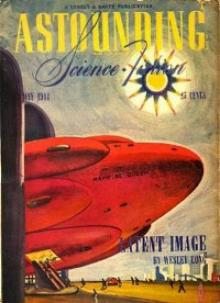 The Yehudi Principle
The Yehudi Principle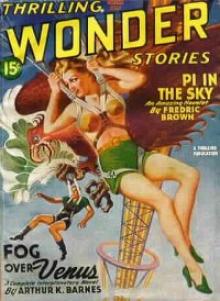 Pi in the Sky
Pi in the Sky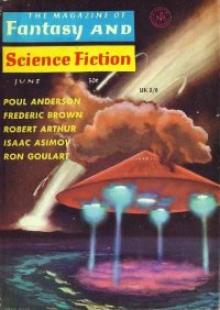 Eine Kleine Nachtmusik
Eine Kleine Nachtmusik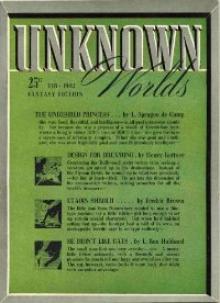 Etaoin Shrdlu
Etaoin Shrdlu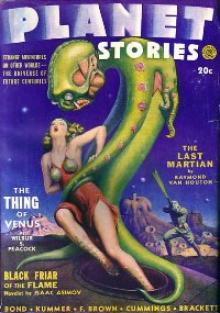 The Star Mouse
The Star Mouse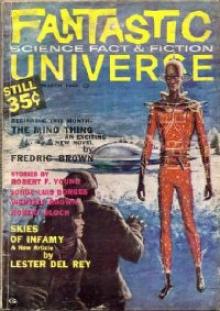 The Mind Thing
The Mind Thing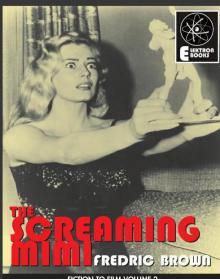 The Screaming Mimi
The Screaming Mimi The Fabulous Clipjoint
The Fabulous Clipjoint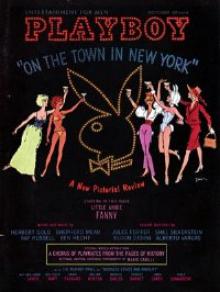 Puppet Show
Puppet Show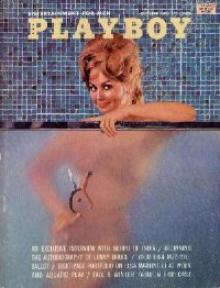 It Didn't Happen
It Didn't Happen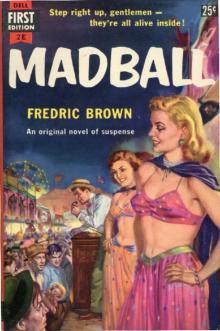 Madball
Madball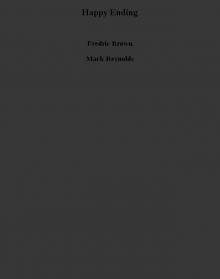 Happy Ending
Happy Ending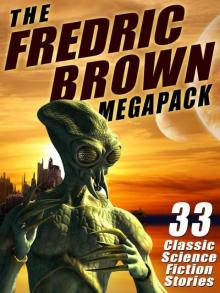 The Fredric Brown Megapack: 33 Classic Science Fiction Stories
The Fredric Brown Megapack: 33 Classic Science Fiction Stories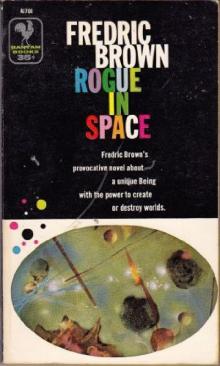 Rogue in Space
Rogue in Space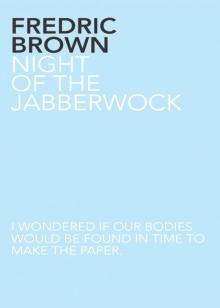 Night of the Jabberwock
Night of the Jabberwock The Dead Ringer
The Dead Ringer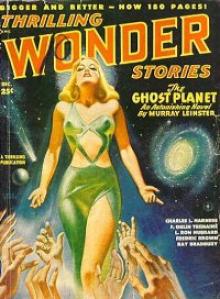 Knock
Knock We All Killed Grandma
We All Killed Grandma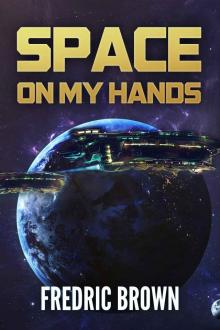 Space On My Hands
Space On My Hands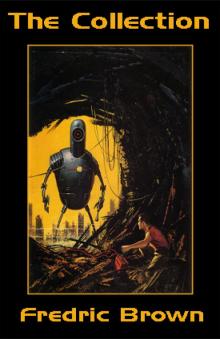 The Collection
The Collection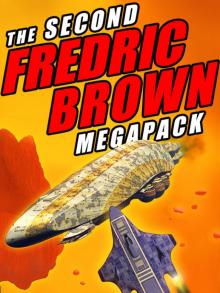 The Second Fredric Brown Megapack: 27 Classic Science Fiction Stories
The Second Fredric Brown Megapack: 27 Classic Science Fiction Stories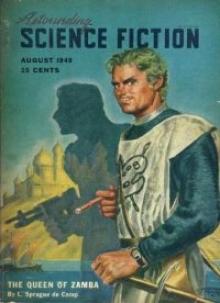 Letter to a Phoenix
Letter to a Phoenix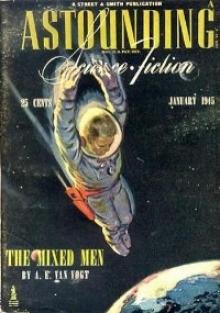 The Waveries
The Waveries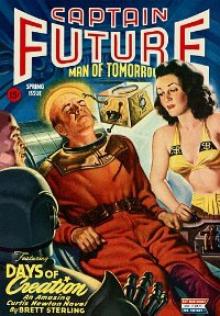 Nothing Sirius
Nothing Sirius The Deep End
The Deep End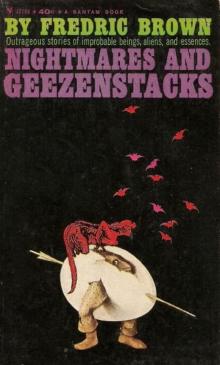 Nightmares & Geezenstacks
Nightmares & Geezenstacks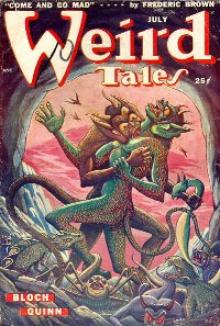 Come and Go Mad
Come and Go Mad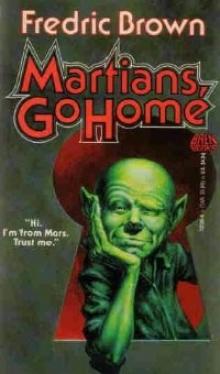 Martians, Go Home
Martians, Go Home